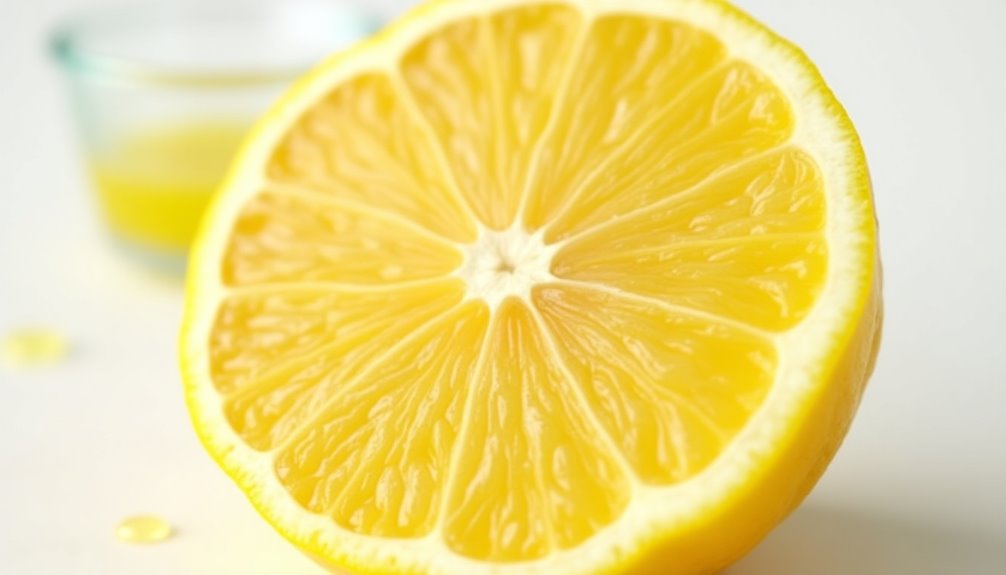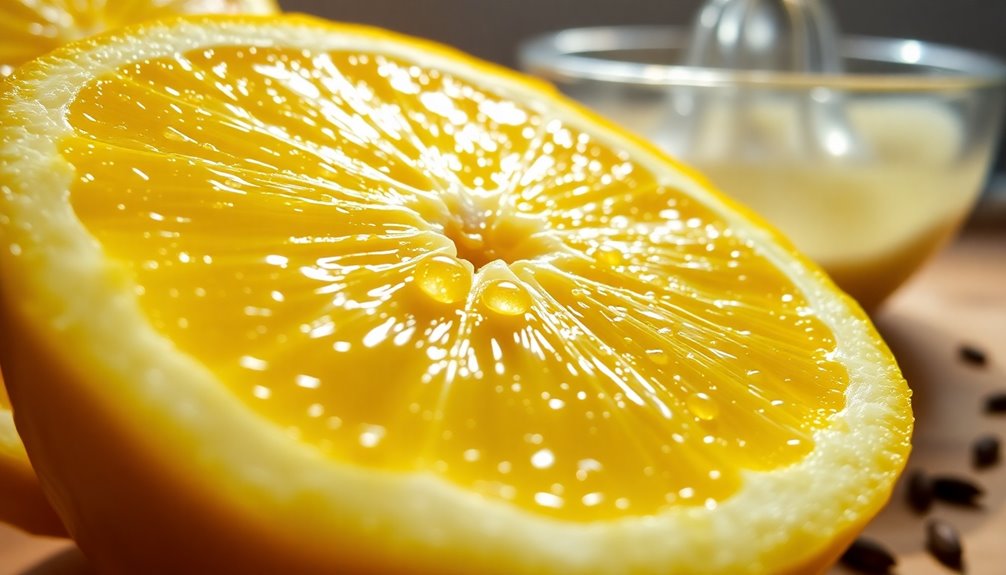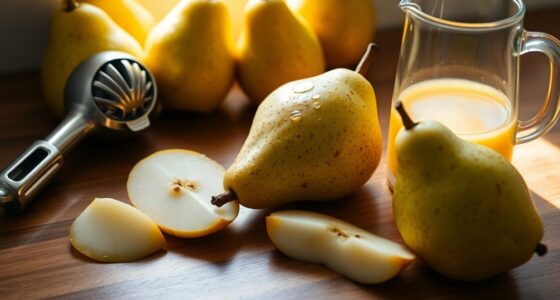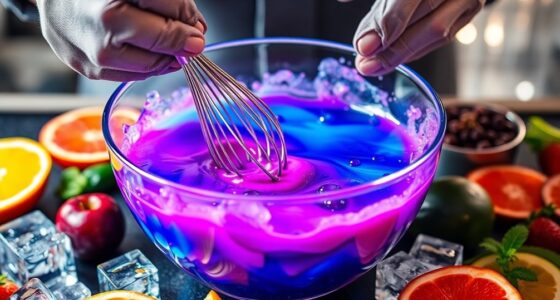Half a medium lemon gives you about 1½ tablespoons of juice, while a half of a large lemon yields around 2 tablespoons. The exact amount depends on the lemon's size and ripeness. If you want to extract more juice, try rolling it on the counter beforehand and ensuring it's at room temperature. Fresh lemon juice can really make a difference in your recipes, and there's more to learn about how to maximize your lemon's flavor and juice yield.
Key Takeaways
- Half of a medium lemon typically yields about 1½ tablespoons of juice.
- Half of a large lemon produces approximately 2 tablespoons of juice.
- Juice yield can vary based on the lemon's size and ripeness.
- Ripe lemons generally provide more juice than under ripe ones.
- For best results, use fresh lemons rather than bottled juice for flavor.

When you're cooking or mixing up a drink, knowing how much juice you can get from half a lemon is handy. Lemons are a versatile citrus fruit that can elevate the flavor of your dishes and beverages. When it comes to measuring juice, you'll find that the yield can vary based on the size and ripeness of the lemon you're using. Generally, half a medium lemon yields about 1½ tablespoons of juice, while half of a large lemon typically produces around 2 tablespoons. This information is especially useful for your recipes, ensuring you get the right amount for that perfect taste.
When you grab a lemon from your kitchen, remember that the size matters. A medium lemon is a common choice in many households and works well for most recipes. If you're using half of a medium lemon, you can expect to extract around 1½ tablespoons of fresh lemon juice. This amount is often sufficient for dressings, marinades, or even to brighten up a sauce.
On the other hand, if you have a large lemon, you can squeeze out approximately 2 tablespoons of juice from just half of it. This extra juice can come in handy, particularly in recipes that require a bolder citrus flavor.
It's essential to consider the ripeness of your lemon too. A ripe lemon will typically yield more juice than one that's under ripe. So, if you're squeezing a lemon and it feels firm, you might want to give it a little roll on the counter before cutting it in half. This technique can help maximize the juice extraction.
Remember, fresh lemon juice is always preferred over bottled alternatives, as it provides a brighter and more vibrant flavor that can significantly enhance your dishes.
When you're preparing a recipe, knowing that a half lemon can yield anywhere from 1 to 2 tablespoons of juice allows for accurate measurements. This precision can be critical, especially in baking or when crafting cocktails. Using the right amount of fresh lemon juice can make a significant difference in the final taste of your creation.
If you find yourself with extra juice, don't worry! Fresh lemon juice can be stored in the refrigerator for a short period or frozen in ice cube trays for later use.
Frequently Asked Questions
How Much Juice Is in Half a Lemon?
When you’re squeezing half a lemon, you can expect to get about 1½ tablespoons of juice from a medium lemon. This amount of juice is perfect for adding a tangy flavor to dressings, marinades, or cocktails. If you’re wondering how much juice in one lemon, a whole medium lemon typically yields about 3 tablespoons of juice. Knowing this can help you adjust your recipes based on how many lemons you have on hand.
If you're using a larger lemon, that amount might increase to around 2 tablespoons.
Keep in mind that the exact yield can vary based on the lemon's size and variety.
How Much of Bottled Lemon Juice Is Equal to 1 Lemon?
Imagine a sun-kissed lemon, bursting with flavor, ready to brighten your dish.
When you need the juice of one medium lemon, you'll typically reach for about 2 tablespoons of bottled lemon juice.
Keep in mind that bottled juice mightn't capture the same vibrant essence as fresh.
So, adjust to your taste; you might find that a little more or less works better for your culinary creation.
Enjoy the zest!
How Much Concentrated Lemon Juice Equals Half a Lemon?
To substitute for half a lemon, you'll need about ¾ tablespoon of concentrated lemon juice.
However, you should adjust to taste since concentrated juice can be more acidic than fresh.
If you prefer a fresher flavor, using freshly squeezed lemon juice is generally better.
It'll enhance your dish more effectively.
Can You Substitute Bottled Lemon Juice for Fresh Lemon Juice?
Did you know that one tablespoon of bottled lemon juice usually equals the juice from half a medium lemon?
You can substitute bottled lemon juice for fresh lemon juice in many recipes, but keep in mind it might alter the flavor. Fresh juice offers a brighter taste due to its volatile oils, while bottled juice often contains preservatives.
For the best flavor, try to use fresh lemon juice whenever you can!
Conclusion
So, the next time you squeeze 1/2 a lemon, you can expect to get about 1 to 2 tablespoons of juice. That's a perfect amount for adding zing to your recipes or drinks! Did you know that lemons are around 5% citric acid? This gives them their signature tart flavor and makes them a fantastic natural preservative. So go ahead and enjoy that citrus goodness – it's not just tasty, but also packed with benefits!
Cindy thoroughly researches juicing trends, techniques, and recipes to provide readers with practical advice and inspiration. Her writing style is accessible, engaging, and designed to make complex concepts easy to understand. Cindy’s dedication to promoting the advantages of juicing shines through her work, empowering readers to make positive changes in their lives through the simple act of juicing.
















